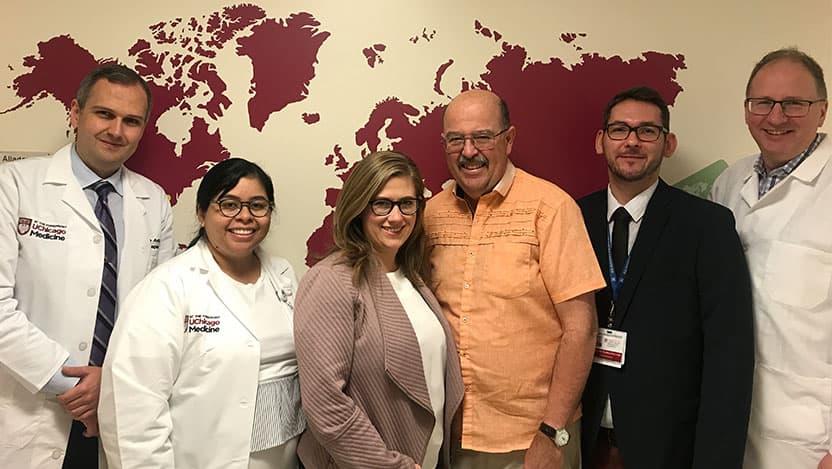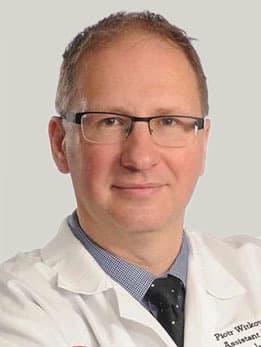Patients with diabetes insulin-free for years after islet transplantation

From left, Piotr Bachul, MD, Islet Cell Transplant Research Fellow; Laurencia Perea, BSN, RN; Lindsay Basto, MSN, RN; islet transplant recipient Mark Morrison; visiting physician Michal Komorniczak, MD, and Piotr Witkowski, MD, PhD, Director, Pancreatic and Islet Transplant Program.
Many people with type 1 diabetes live in fear of their blood sugar levels suddenly getting too low. If untreated, this hypoglycemia can cause confusion, loss of consciousness and even death.
While most diabetics can control their glucose levels with insulin, some are considered “brittle” – their glucose levels can swing wildly, often dropping without the usual warning signs of shakiness or sweating.
Ten years ago, Mark Morrison, who has had diabetes since he was 16, couldn’t feel his lows coming on. Hypoglycemia caused him to crash his car twice. In one accident, he hit a tree and broke his sternum. In the other crash, his car caught fire.
“I could eat the same food, have the same amount of activity, and take the same insulin each day, and one day I would have high blood sugar, and then another day I would have low blood sugar,” said Morrison, who is now 64.
Mallory Kon, diagnosed with diabetes when she was 5, found that as an adult, her blood sugar would go from normal to dangerously low within an hour. Sometimes, her glucose levels would get so low that she would fall asleep without realizing it. “I was not feeling my lows anymore,” she said, “which was really scary.”

Today, Morrison has been off insulin for 9 years after enrolling in a clinical trial at the University of Chicago Medicine to receive an innovative procedure: an islet transplant. Islets, clusters of cells in the pancreas, contain several types of cells, including beta cells that produce insulin. In type 1 diabetes, a person’s own immune system destroys those beta cells, causing diabetics to need daily insulin to control their glucose levels.
An islet transplant transfers donor islets into a diabetic patient’s body. Through the procedure, surgeons infuse donor islets via a small catheter into a patient’s liver without the need for surgery. The beta cells within the islets then begin to produce insulin, and act as a pancreas. Currently, as with any organ transplants, patients still must take anti-rejection medications after the procedure.
Morrison had the transplant in November 2013, and just three weeks later, he was completely off insulin. “I could have Thanksgiving dinner and not worry about how much insulin I needed, and I’ve been off insulin ever since,” he said. “It has been such a blessing for me. I feel so fortunate this happened.”
Most Active Center Offering Islet Transplants
Since 2005, surgeons at UChicago Medicine, led by transplant surgeon Piotr Witkowski, MD, have performed 79 islet transplants— including 11 transplants this year. This makes UChicago the most active center islet transplant center of the three currently offering the procedure in the U.S. “The high cost covered only by research funding limits the number of transplants and patient access to this leading-edge therapy,” Witkowski said.
“These patients often live in constant fear of dying,” Witkowski added. “This procedure is less invasive than a pancreas transplant and could potentially help hundreds of the most desperate, out of over 1.5 million patients with type 1 diabetes in the U.S.”
Though the procedure has been approved in several countries in Europe as well as in Canada and Australia, it is still considered experimental in the United States. In contrast to other countries, the FDA classifies islets as a biologic drug, not as a tissue or organ for transplant, and has not given islet transplantation full approval.
Witkowski performs the procedure in clinical trials and continues to work on getting approval so any patient who is eligible could receive the therapy. He recently published a perspectives article in the journal Frontiers in Endocrinology arguing for the inclusion of islets into the existing regulatory framework of organs for transplantation.
“Although over the last 20 years islet transplantation has been proven to be safe and effective, it is very unfortunate that current regulations still prevent islets from being available and reimbursed for Americans with diabetes,” Witkowski said. “We need this as the standard of care.”
Continuing to Improve the Procedure
After receiving donor islets in 2014, Kon was off insulin within months. She felt weak for six months after the procedure and craved fatty foods, but that paled in comparison to her previous life of worrying about her glucose levels as she traveled half the year for work.
“I used to have to carry an emergency can of Coca-Cola in my purse, and now I can just go out and not have to worry about my blood sugar falling low or carrying insulin,” said Kon, who is now 35. “I volunteer for more projects at work because I know I don’t have to worry about my blood sugar while in a meeting or traveling around the country.”
Morrison found he was able to double the miles he could run shortly after the transplant, eventually running a half marathon. He also found that the nerve pain in his hands and feet – a side effect of diabetes – stopped progressing. In his job delivering auto parts, he no longer has to worry about car accidents due to hypoglycemia.
“I know I’ll be able to keep my feet, and my life expectancy has gone up dramatically,” he said. “My blood sugar is now always controlled. In fact, it’s better than most people’s.”
Morrison, Kon and another patient gathered last fall to celebrate 8 years off insulin and compare notes on their new lives. All still visit Witkowski’s clinic for follow-up visits, and all keep in touch regularly with islet transplant nurses Lindsay Basto, MS, RN, and Laurencia Perez, BSN, RN. “He’s the smartest man I’ve ever met,” Morrison said.
Witkowski continues to study ways to improve outcomes in islet transplantation, such as giving patients anti-inflammatory medication. His team is now working with a company to test putting islets into a device within a patient’s abdominal wall instead of the liver.
“Both Mallory and Mark are examples of patients who have benefited from our advances in islet transplantation therapy, enjoying long-term diabetes-free life after only a single islet infusion and practically without side effects related to immunosuppression,” Witkowski said. “Their kidney, heart and other organ functions, as well as diabetic retinopathy and neuropathy, have remained stable or improved over time.
“Islet transplantation has been proven to be safe and effective, and we are continuing to try to improve outcomes through these different avenues,” he said. “The technology is there. Islet transplantation needs be available to many more patients so we can progress the field, enhance the effectiveness and limit side effects. We hope that our call for urgent regulatory updates will be heard and implemented.”

Piotr Witkowski, MD, PhD
Dr. Witkowski is a leading expert in islet transplantation. He was instrumental in developing an optimized islet isolation technique that greatly improved success in clinical transplants.
Learn more about Dr. WitkowskiKovler Diabetes Center
UChicago Medicine offers a patient-centered, science-based approach for managing insulin-dependent Type 1 diabetes, complex Type 2 diabetes, gestational, pre-diabetes and monogenic diabetes.
Learn more about our expertise